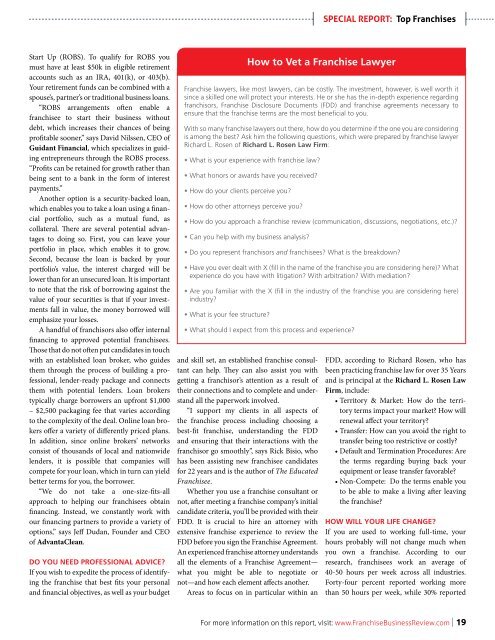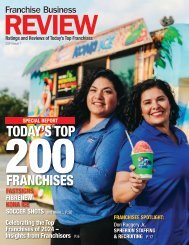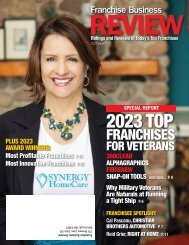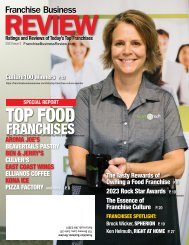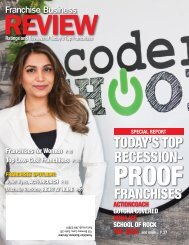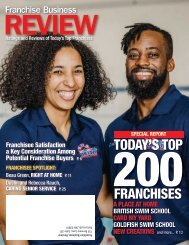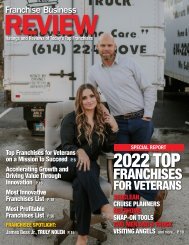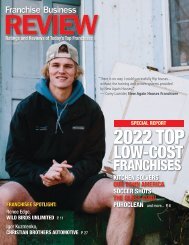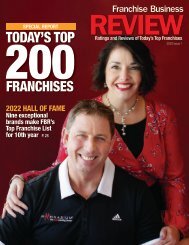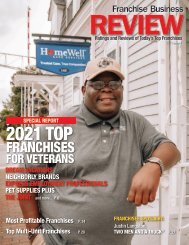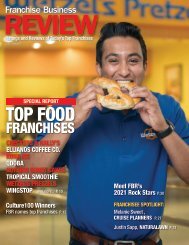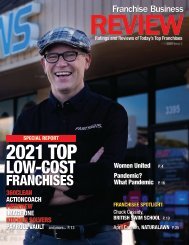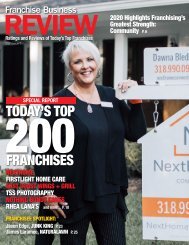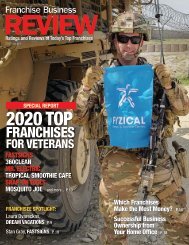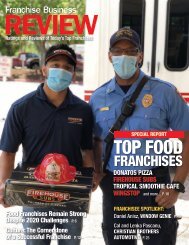2015 Guide to Today's Top Franchises
The latest data and trends in franchising, and our list of the top franchise opportunities for 2015!
The latest data and trends in franchising, and our list of the top franchise opportunities for 2015!
You also want an ePaper? Increase the reach of your titles
YUMPU automatically turns print PDFs into web optimized ePapers that Google loves.
SPECIAL REPORT: <strong>Top</strong> <strong>Franchises</strong><br />
Start Up (ROBS). To qualify for ROBS you<br />
must have at least $50k in eligible retirement<br />
accounts such as an IRA, 401(k), or 403(b).<br />
Your retirement funds can be combined with a<br />
spouse’s, partner’s or traditional business loans.<br />
“ROBS arrangements often enable a<br />
franchisee <strong>to</strong> start their business without<br />
debt, which increases their chances of being<br />
profitable sooner,” says David Nilssen, CEO of<br />
Guidant Financial, which specializes in guiding<br />
entrepreneurs through the ROBS process.<br />
“Profits can be retained for growth rather than<br />
being sent <strong>to</strong> a bank in the form of interest<br />
payments.”<br />
Another option is a security-backed loan,<br />
which enables you <strong>to</strong> take a loan using a financial<br />
portfolio, such as a mutual fund, as<br />
collateral. There are several potential advantages<br />
<strong>to</strong> doing so. First, you can leave your<br />
portfolio in place, which enables it <strong>to</strong> grow.<br />
Second, because the loan is backed by your<br />
portfolio’s value, the interest charged will be<br />
lower than for an unsecured loan. It is important<br />
<strong>to</strong> note that the risk of borrowing against the<br />
value of your securities is that if your investments<br />
fall in value, the money borrowed will<br />
emphasize your losses.<br />
A handful of franchisors also offer internal<br />
financing <strong>to</strong> approved potential franchisees.<br />
Those that do not often put candidates in <strong>to</strong>uch<br />
with an established loan broker, who guides<br />
them through the process of building a professional,<br />
lender-ready package and connects<br />
them with potential lenders. Loan brokers<br />
typically charge borrowers an upfront $1,000<br />
– $2,500 packaging fee that varies according<br />
<strong>to</strong> the complexity of the deal. Online loan brokers<br />
offer a variety of differently priced plans.<br />
In addition, since online brokers’ networks<br />
consist of thousands of local and nationwide<br />
lenders, it is possible that companies will<br />
compete for your loan, which in turn can yield<br />
better terms for you, the borrower.<br />
“We do not take a one-size-fits-all<br />
approach <strong>to</strong> helping our franchisees obtain<br />
financing. Instead, we constantly work with<br />
our financing partners <strong>to</strong> provide a variety of<br />
options,” says Jeff Dudan, Founder and CEO<br />
of AdvantaClean.<br />
DO YOU NEED PROFESSIONAL ADVICE?<br />
If you wish <strong>to</strong> expedite the process of identifying<br />
the franchise that best fits your personal<br />
and financial objectives, as well as your budget<br />
Franchise lawyers, like most lawyers, can be costly. The investment, however, is well worth it<br />
since a skilled one will protect your interests. He or she has the in-depth experience regarding<br />
franchisors, Franchise Disclosure Documents (FDD) and franchise agreements necessary <strong>to</strong><br />
ensure that the franchise terms are the most beneficial <strong>to</strong> you.<br />
With so many franchise lawyers out there, how do you determine if the one you are considering<br />
is among the best? Ask him the following questions, which were prepared by franchise lawyer<br />
Richard L. Rosen of Richard L. Rosen Law Firm:<br />
• What is your experience with franchise law?<br />
• What honors or awards have you received?<br />
• How do your clients perceive you?<br />
• How do other at<strong>to</strong>rneys perceive you?<br />
• How do you approach a franchise review (communication, discussions, negotiations, etc.)?<br />
• Can you help with my business analysis?<br />
• Do you represent franchisors and franchisees? What is the breakdown?<br />
• Have you ever dealt with X (fill in the name of the franchise you are considering here)? What<br />
experience do you have with litigation? With arbitration? With mediation?<br />
• Are you familiar with the X (fill in the industry of the franchise you are considering here)<br />
industry?<br />
• What is your fee structure?<br />
How <strong>to</strong> Vet a Franchise Lawyer<br />
• What should I expect from this process and experience?<br />
and skill set, an established franchise consultant<br />
can help. They can also assist you with<br />
getting a franchisor’s attention as a result of<br />
their connections and <strong>to</strong> complete and understand<br />
all the paperwork involved.<br />
“I support my clients in all aspects of<br />
the franchise process including choosing a<br />
best-fit franchise, understanding the FDD<br />
and ensuring that their interactions with the<br />
franchisor go smoothly”, says Rick Bisio, who<br />
has been assisting new franchisee candidates<br />
for 22 years and is the author of The Educated<br />
Franchisee.<br />
Whether you use a franchise consultant or<br />
not, after meeting a franchise company’s initial<br />
candidate criteria, you’ll be provided with their<br />
FDD. It is crucial <strong>to</strong> hire an at<strong>to</strong>rney with<br />
extensive franchise experience <strong>to</strong> review the<br />
FDD before you sign the Franchise Agreement.<br />
An experienced franchise at<strong>to</strong>rney understands<br />
all the elements of a Franchise Agreement—<br />
what you might be able <strong>to</strong> negotiate or<br />
not—and how each element affects another.<br />
Areas <strong>to</strong> focus on in particular within an<br />
FDD, according <strong>to</strong> Richard Rosen, who has<br />
been practicing franchise law for over 35 Years<br />
and is principal at the Richard L. Rosen Law<br />
Firm, include:<br />
• Terri<strong>to</strong>ry & Market: How do the terri<strong>to</strong>ry<br />
terms impact your market? How will<br />
renewal affect your terri<strong>to</strong>ry?<br />
• Transfer: How can you avoid the right <strong>to</strong><br />
transfer being <strong>to</strong>o restrictive or costly?<br />
• Default and Termination Procedures: Are<br />
the terms regarding buying back your<br />
equipment or lease transfer favorable?<br />
• Non-Compete: Do the terms enable you<br />
<strong>to</strong> be able <strong>to</strong> make a living after leaving<br />
the franchise?<br />
HOW WILL YOUR LIFE CHANGE?<br />
If you are used <strong>to</strong> working full-time, your<br />
hours probably will not change much when<br />
you own a franchise. According <strong>to</strong> our<br />
research, franchisees work an average of<br />
40-50 hours per week across all industries.<br />
Forty-four percent reported working more<br />
than 50 hours per week, while 30% reported<br />
For more information on this report, visit: www.FranchiseBusinessReview.com | 19


